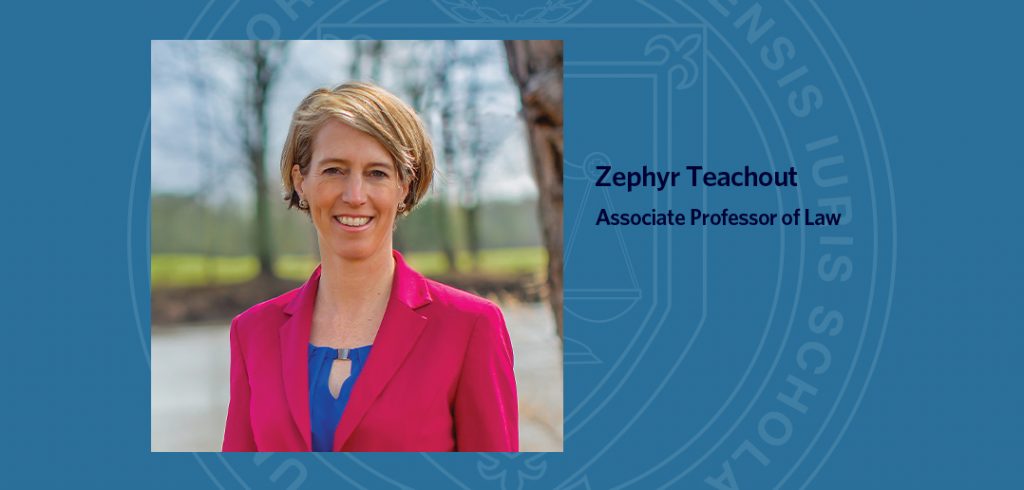In TikTok v. Garland, the Supreme Court will determine whether TikTok—the social media platform used by an estimated 170 million Americans—can continue to operate in the United States under the ownership of a Chinese holding company. Columbia Law Professor Jameel Jaffer and Fordham Law Professor Zephyr Teachout join Jeffrey Rosen—host of We the People podcast and president and CEO of National Constitution Center—to debate whether the law that forces TikTok to be sold or banned violates the First Amendment.
Excerpt from Interview: Zephyr Teachout argues that the law requiring TikTok’s divestiture aligns with U.S. tradition of regulating foreign ownership to protect sovereignty and democracy.
Zephyr Teachout: Okay. But it’s this law the Protect Americans From Foreign Adversary Controlled Applications, which then defines foreign adversary controlled applications to include TikTok and any other website that has more than a million users and is owned by a company in one of a series of foreign adversary designated countries. And the statute it refers to for defining foreign adversaries is a pre existing statute. So it says basically if you’re gonna have a social media app, and there’s some technical definitions, but it’s a pretty brief description. It can’t be controlled by foreign government, that is a foreign adversary as defined by this pre existing statute under the ACT app stores and hosting services cannot distribute this foreign adversary controlled app unless it is divested. So to be precise and, I’m sure we’ll talk about this more, the act does not ban TikTok.
It requires its divestiture from ByteDance, a Chinese government controlled company. And I think that’s important before I get into history, because this is fundamentally a law about regulating the ownership structure of communications infrastructure. The briefs that I filed also really relies on history and goes back to history, because there is a long deep tradition in this country. And yes, in other countries, a tradition that is steeped in a vision of sovereignty. And before I get to history, Jeffrey, I’d just like to briefly talk about sovereignty, ’cause that’s really, to me what’s at stake here is that the idea of self-governance is to me, essential for freedom, essential for human liberty, essential for democracy. And self-governance requires sovereignty, which requires a nation that is self-governing. And an essential feature of sovereignty includes the ability to restrict foreign governments from interfering in domestic affairs.
So at the constitutional convention, it’s not just that Hamilton talked about the threat of foreign interference, it was close to a constant conversation. The Emoluments Clause, unfortunately, is rearing its head again as Donald Trump is poised to enter office with, again, looking to be violating the foreign emoluments clause. Embedded in our constitution is a law that prohibits foreign governments, in particular, from giving gifts or anything of value to presidents. There’s been restrictions on foreign banks since the founding of the country, restrictions on foreign ownership of shipping, and in particular, the greatest area of activity has been restrictions on ownership of communications infrastructure. So the Radio Act and various amendments to that, up to this current day limit foreign ownership of radio, television, and other infrastructure. You may remember that Murdoch had to become an American citizen in order to run his media empire here.
And so, what I see as a core regulation of ownership by foreign governments is a core feature of sovereignty and doesn’t implicate the First Amendment, but rather falls directly in line with a 240 odd year history of protecting American democracy. Now, whether or not you agree with a particular law, and I actually do think I do support the particular law, I think that history is extremely important. So when we think of like the cluster of cases we put it with, I put this with, not just with the history of cases, upholding foreign restrictions, but with then Judge Kavanaugh saying it’s okay to limit, foreign contributions to campaigns in the United States with the series of efforts around the country to limit foreign corporate Super PACS. That there’s a sort of series of efforts that I think are more urgent, because of the nature of technology to protect American democracy from foreign governmental interference.
Listen to the complete Jan. 9, 2025 episode, “The Future of TikTok.”

